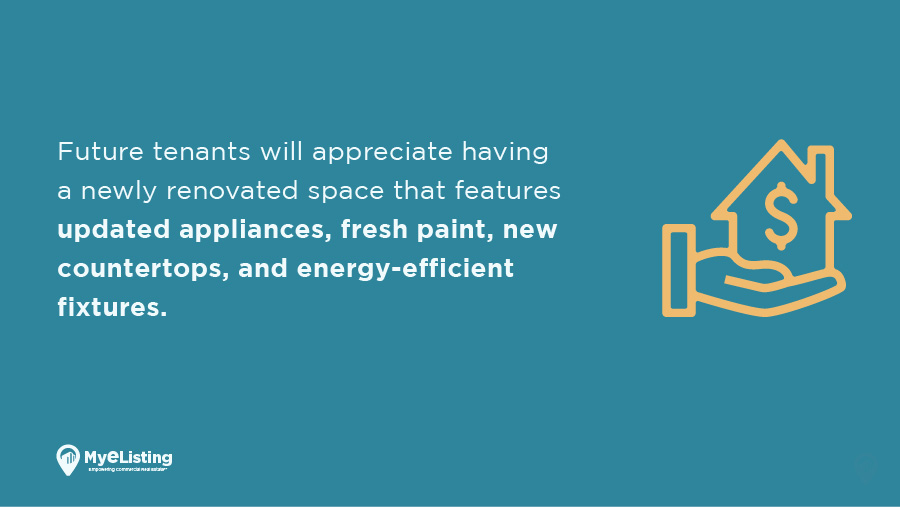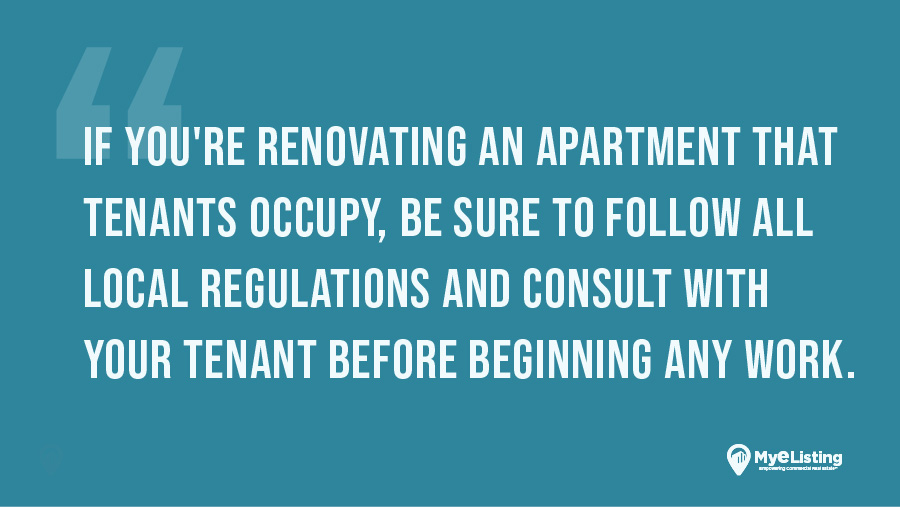Landlord’s Guide to Apartment Renovation

Specializes in providing actionable insights into the commercial real estate space for investors, brokers, lessors, and lessees. He covers quarterly market data reports, investment strategies, how-to guides, and top-down perspectives on market movements.

All landlords want their properties to be desirable and in demand. After all, this is how you make money as an investor. To do that, you need to offer your renters a great living experience and excellent amenities. The best way to accomplish this is through a strategic and well-thought-out renovation.
However, with any project, there are always potential pitfalls. Landlords who aren’t informed about the process can encounter issues with contractors, tenants, or insurance companies.
Learn how to navigate the tricky world of multifamily renovations as a landlord with this guide.
Why Should I Renovate My Rental Property?

As a landlord, you may ask yourself why you should renovate your rental property. Your tenants are currently living there and may not be too thrilled about being displaced during a renovation. However, there are several good reasons to renovate your rental property, even if it means your current tenants have to move out temporarily.
For one, future tenants will appreciate having a newly renovated space that features updated appliances, fresh paint, new countertops, and energy-efficient fixtures. These amenities can make your rental property more attractive to potential tenants and help increase its value; multifamily renovation loans can be a way to pay for it.
Tax Benefits & Deductions
Additionally, many landlords are able to deduct the costs of renovations from their taxes as long as they are considered necessary repairs or improvements. This could be anything from installing a new HVAC system to upgrading the cabinets in your rental property.
In order to get the maximum benefit from these deductions, you should time them with the schedule of your rental property. For example, if you know that your property will be vacant for several weeks during the winter, you could make those renovations during that time and avoid lost rental revenue.
Ultimately, whether or not to renovate your rental property is a decision that depends on many factors. However, if you do decide to renovate, be sure to consult with your tenants and give them plenty of notice before starting any work.
How to Prioritize Which Renovations to Tackle First

You’ll want to consider a few things when prioritizing renovations: property value, tenant comfort, and return on investment (ROI). If you’re renovating to sell, then you’ll want to focus on high-value projects that will attract buyers.
If you’re renovating to rent, then you’ll want to focus on projects that will make your property more attractive to tenants and improve tenant comfort. If you’re renovating for yourself, then you’ll want to focus on projects with a high ROI. For example, a kitchen or bathroom renovation will typically have a higher ROI than replacing a faucet.
How to Renovate When Tenants Occupy Your Property
If you want to renovate your property while it is occupied by tenants, you need to check your lease agreement. Some leases allow for renovations with the permission of the tenant, while others do not allow any changes to be made to the property during the tenancy.
It is important to check your lease agreement before starting any renovations, as you could be in breach of your lease if you make changes without the tenant’s permission. If you are allowed to renovate, you will need to offer the tenant a rent-free period in another unit or a reduced rent while the work is being carried out.
The laws around renovations vary by state, so it is important to check with your local authority before starting any work.
How to Warn Tenants Before Renovating
Before starting any major renovations, you’ll want to let your tenants know what is going on. Contact them and give them plenty of warning so that they can prepare for the work. It’s best to give tenants plenty of notice.
If possible, offer them temporary housing or rent abatement while the work is being done so that they don’t have to live in a construction zone long term.
Permits
A permit is not always required for property renovations, but it depends on the type and scope of the project. For example, if you’re planning a major renovation that will alter the structure of your home, you’ll need to get a permit. On the other hand, a permit may not be necessary if you’re simply repainting your apartment.
In general, most rental properties will require some sort of inspection before approving any renovation project. If you’re unsure whether or not your planned renovation will require a permit, it’s best to consult with your landlord or the local building authority.
Are Landlords Required to Fix All Issues With an Apartment?
A landlord is not automatically required to fix a problem with an apartment just because a tenant reports it. The landlord is only required to make repairs that are necessary to keep the apartment habitable and in compliance with local building codes.
If the problem is not serious, the landlord may choose to wait until the end of the lease.
Tenants’ Rights During Renovation

Tenants have certain rights during renovations, especially when it comes to their quiet enjoyment. Landlords must follow renovation regulations, which vary by state, but they must follow some general rules as well.
For example, landlords must begin renovations during a time that will not disturb the tenants, and they must provide adequate notice before starting any work. Tenants are also within their rights to ask for a rent reduction while the work is being done.
If you’re renovating a rental property that tenants occupy, you’ll want to consult with a contractor before beginning any major work. A builder can create an action plan that will minimize the amount of time the property needs to be vacant while minimizing interference with the tenant’s daily routine.
Additionally, if you do plan to offer temporary housing to your tenant, be sure to check your local apartment regulations for requirements around temporary housing.
If you’re renovating an apartment that tenants occupy, be sure to follow all local regulations and consult with your tenants before beginning any work. Additionally, it is important to remember that the landlord must make necessary repairs, but not necessarily cosmetic improvements.
List & Browse Commercial Real Estate for Free on MyEListing.com!
You can list and browse commercial real estate for free right here on MyEListing.com.
Simply sign up for a free account and get unlimited access to accurate local market intelligence, customized property type alerts, comp software, and more.
Article Search
Share
All Article Categories








